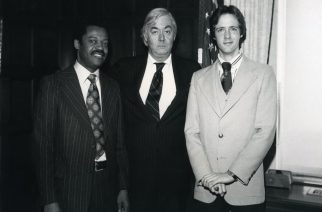
After a four-month investigation into claims of a gender-based hostile work environment, New York State’s Attorney General is taking a legal stand against shamed film producer Harvey Weinstein and the New York City-based Weinstein Company.
Attorney General Eric Schneiderman this week filed a civil lawsuit against Harvey Weinstein, his brother Robert, and the Weinstein Company for “a pattern of quid pro quo sexual harassment and routine misuse of corporate resources for unlawful ends.”
Schneiderman is urging anyone who may have been a victim or witness of this misconduct to come forward and contact his office.
Stories of Harvey Weinstein’s abuse of women in Hollywood have been an open secret for years. However separate New York Times and New Yorker articles thrust these stories of assault, bribery and coercion into the national spotlight, creating the #MeToo movement to raise awareness the prevalence of sexual assault and harassment primarily in the workplace.
The investigation conducted by the office of the Attorney General uncovered years of hidden sexual assault and various misconduct claims by the company’s female employees. Detailed accounts of the hostile work environment are detailed in the suit.
According to the suit, unveiled February 11, Weinstein used degrading sexual terms to scold both male and female employees. Gender stereotypes were used to insult women both behind closed doors and among other company personnel.
The investigation on the company also revealed that Weinstein had three groups of women facilitate “sexualized and demeaning roles.” Each group had different sets of responsibilities.
One group, said to be called Weinstein’s “roster” or “wing women,” were kept on company payroll in the company’s New York, Los Angeles and London offices. They were responsible for taking Weinstein to parties and introducing him to young actresses and others seeking employment who he could attempt to engage in sexual relations with.
The second group were Weinstein’s assistants. Their job was to “further Weinstein’s regular sexual activity.” They would contact potential sexual partners for Weinstein and leave space in his calendar for sexual activity. According to the suit, two employees described having to obtain erectile dysfunction shots for Weinstein, one of whom received a bonus for obtaining and sometimes administering the injection.
Other accounts from female assistants include having to ensure Weinstein had an adequate supply of erectile dysfunction injections in his travel bag and preparing and cleaning up the rooms where Weinstein had sexual encounters.
The third group was comprised of female company executives. Although their actual job responsibilities were to help the company produce films and television projects, they were “forced to facilitate, [Harvey Weinstein’s] sexual conquests,” according to the attorney general’s lawsuit suit.
They were required to meet possible sexual partners and follow through on Weinstein’s promise of employment opportunities in exchange for sexual favors. “One female executive described her dismay at being compelled to take meetings clearly not for business purposes but for the purpose of facilitating [Harvey Weinstein’s] sex life.” Male executives were not expected to take part in these meetings.
According to the lawsuit, corporate credit cards were often used by Weinstein to purchase gifts for the women he would engage in sexual relations with and corporate funds were used to pay for office space or hotel rooms. The female employee responsible for coding Weinstein’s expenses was told to label the expenses “business” as often as possible.
Employees were at times threatened with termination if they did not follow through with Weinstein’s demands. While Weinstein was able to intimidate some women from speaking up, others did file complaints with the company’s human resources office, but no formal investigation or actions were ever initiated.

The suit describes multiple situations where human resources turned away complaints made from female employees about Weinstein. Victims say that the human resources director told them there was “nothing he could do to address the misconduct.”
According to the lawsuit, the investigation also found that “on not a single occasion was [Harvey Weinstein] subject to a formal investigation or to restrictions on his behavior or adverse employment consequences, as a result of any complaint.” Many of the complaints were hidden by the company through non disclosure agreements.
Along with the company, Weinstein’s brother, Robert Weinstein, is being held accountable for aiding his brother in his alleged sexual assaults. The suit claims that Robert Weinstein was aware of the claims and also failed to take any action. As co-owner, co-chairman and co-CEO, he was present at meetings where Weinstein used demeaning slurs to refer to employees, the suit alleges.
The lawsuit holds the company responsible for not protecting employees from sexual harassment and discrimination, hence breaking New York state law. Weinstein “persistently violated New York Penal Law provisions prohibiting forcible touching, sexual abuse and coercion, unlawful sexual misconduct, criminal acts and attempts to commit the same.”
The 39-page lawsuit unveiled by the Attorney General’s Office details a host of other offenses, including:
- On one occasion in 2015, Weinstein asked a female employee to go to his hotel room at the end of the day to set up his phone and devices for the next day. Upon her arrival at the hotel room, Weinstein appeared naked under a bathrobe and asked the employee for a massage. When the employee said no, Weinstein cajoled, badgered, and insisted until she relented and, against her wishes, submitted to massaging him out of fear of employment-based retaliation. The incident was reported to the human resources office, but the matter was dropped.
- On other occasions in 2014 and 2015, Weinsten exposed himself to a female employee and made her take dictation from him while he leered at her, naked on his bed. That same employee described how Weinstein would insist that she sit next to him in the back seat of his chauffeured vehicle and would place his hand on her upper thigh and buttocks near her genitalia and rub her body without her consent. When she attempted to place bags or other barriers between them to make it harder for him to reach her, he moved the barriers or repositioned himself so that the unwelcome sexual contact could continue. This employee believed she would face adverse employment consequences unless they acquiesced to such demands.
- On another occasion, Weinstein said he might have to fire a female employee because his daughter (for whom the employee was providing assistance at Weinstein’s direction) was angry with her, and he asked the employee what she was “prepared to do” to keep her job – a proposition that the female employee understood was a demand for quid pro quo sexual activity. The employee quit rather than submit to the demand for sex in exchange for continued employment.
The suit seeks to free employers from the non-disclosure agreements and to receive restitution and damages.
The investigation by the Office of the Attorney General is ongoing.
“Any sale of The Weinstein Company must ensure that victims will be compensated, employees will be protected going forward, and that neither perpetrators nor enablers will be unjustly enriched,” Schneiderman said. “Every New Yorker has a right to a workplace free of sexual harassment, intimidation and fear.”









